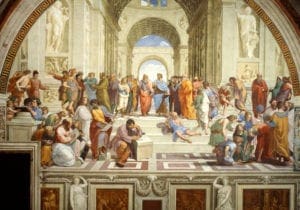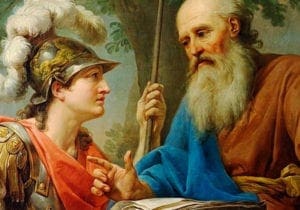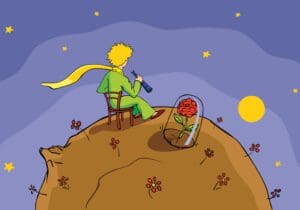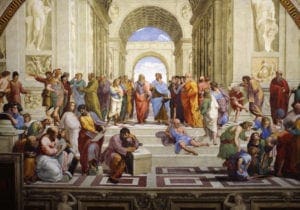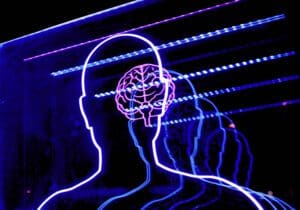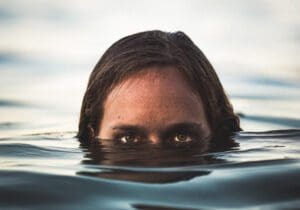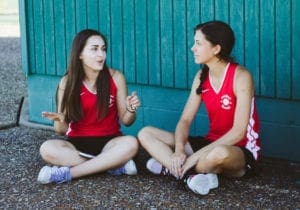
La conoscenza, ovvero il sapere, è una virtù alla base di ognuno di noi e dell’Umanità in generale. Avere conoscenza vuol dire essere curiosi, cercare sempre la verità e mettere sempre in dubbio qualunque certezza.
La conoscenza, quindi, va guadagnata attraverso un continuo lavoro quotidiano, libero dai preconcetti e dalle regole imposte. Sapere tutto è impossibile, ma è doveroso non fermarsi mai davanti alle nostre domande.
Ecco quindi una raccolta delle più belle frasi sul sapere e sulla conoscenza (in inglese e italiano) che ce ne faranno capire l’importanza, così come anche i limiti. Scoprile subito!
Aforismi, citazioni e frasi sul sapere e sulla conoscenza in inglese (con traduzione)
- Any fool can know. The point is to understand.
Chiunque può sapere. Il difficile è capire.
(Albert Einstein) - The only true wisdom is in knowing you know nothing.
L’unica vera saggezza è sapere di non sapere nulla.
(Socrate) 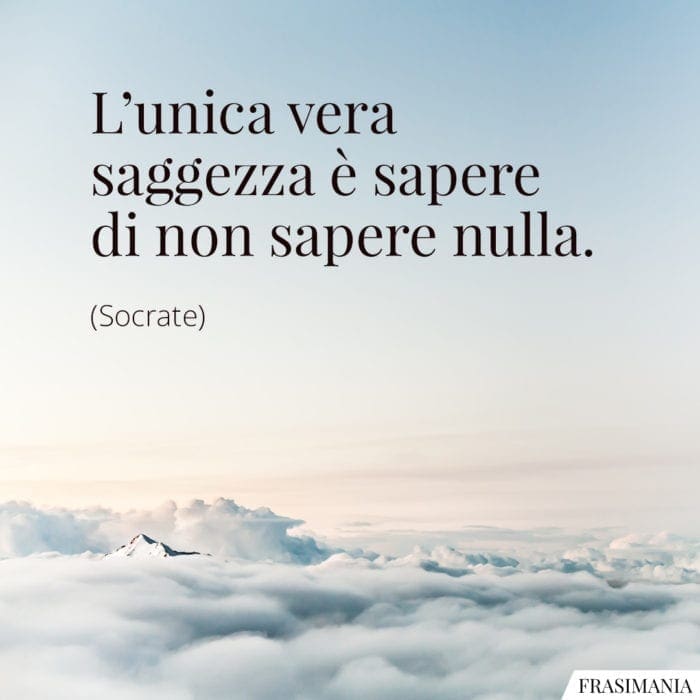
- What we know is a drop. What we don’t know is an ocean.
Quello che sappiamo è una goccia. Quello che non sappiamo, un oceano.
(Isaac Newton) - Doubt grows with knowledge.
Il dubbio cresce con la conoscenza.
(Johann Wolfgang von Goethe) 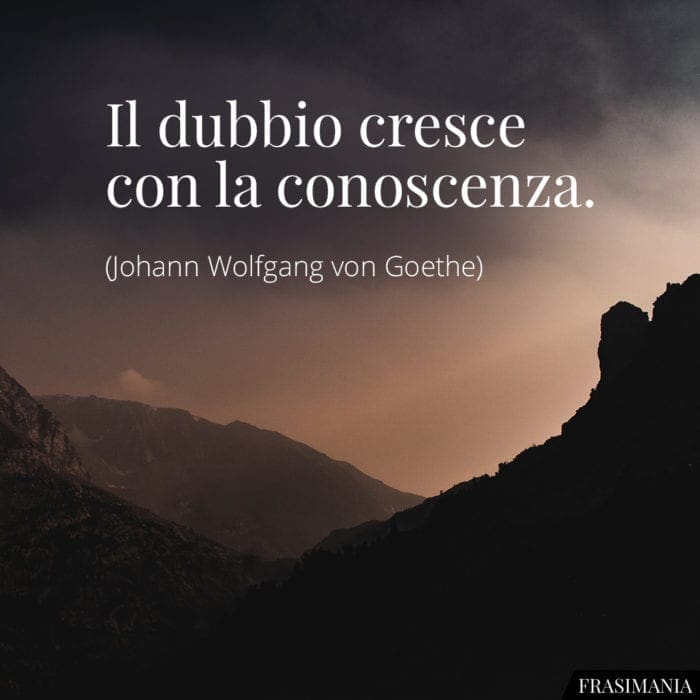
- Reading furnishes the mind only with materials of knowledge; it is thinking that makes what we read ours.
Leggere arricchisce la mente di conoscenza, ma è il pensiero che fa diventare nostro quello che leggiamo.
(John Locke) - I swear to you gentlemen, that to be overly conscious is a sickness, a real, thorough sickness.
Vi giuro signori, che avere coscienza di troppe cose è una malattia, una vera e propria malattia.
(Fëdor Dostoevskij) - The man who asks a question is a fool for a minute, the man who does not ask is a fool for life.
Colui che chiede è stupido per un minuto, colui che non chiede è stupido per tutta la vita.
(Confucio) 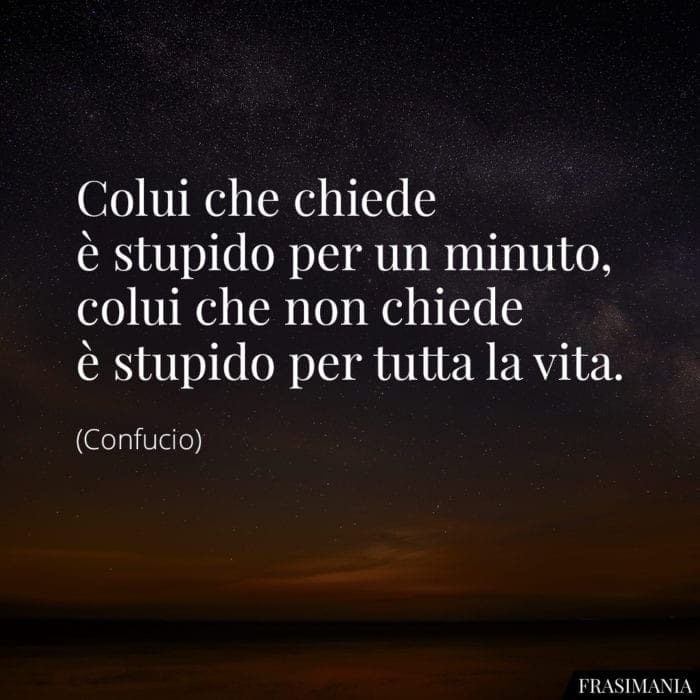
- If money is your hope for independence you will never have it. The only real security that a man will have in this world is a reserve of knowledge, experience, and ability.
Se il denaro è la tua speranza di indipendenza, non lo avrai mai. L’unica vera sicurezza che un uomo avrà in questo mondo è una riserva di conoscenza, esperienza e abilità.
(Henry Ford) - The noblest pleasure is the joy of understanding.
Il piacere più nobile è la gioia di comprendere.
(Leonardo da Vinci) - Beware of false knowledge; it is more dangerous than ignorance.
Diffida della falsa conoscenza, è molto peggiore dell’ignoranza.
(George Bernard Shaw) 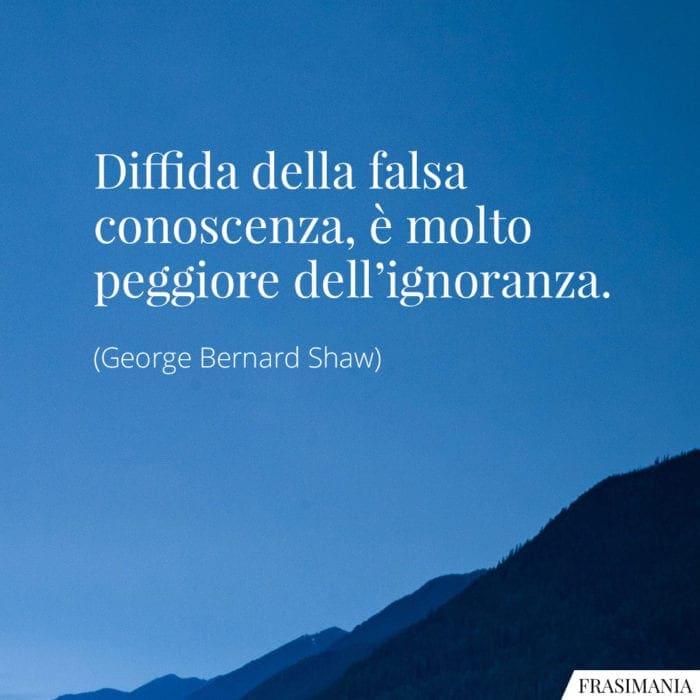
- Anyone who stops learning is old, whether at twenty or eighty. Anyone who keeps learning stays young. The greatest thing in life is to keep your mind young.
Chiunque smetta di imparare è vecchio, che abbia venti o ottant’anni. Chiunque continua ad imparare resta giovane. La cosa più importante nella vita è mantenere la mente giovane.
(Henry Ford) - I don’t study to know more, but to ignore less.
Non studio per sapere di più, ma per ignorare di meno.
(Juana Inés de la Cruz) 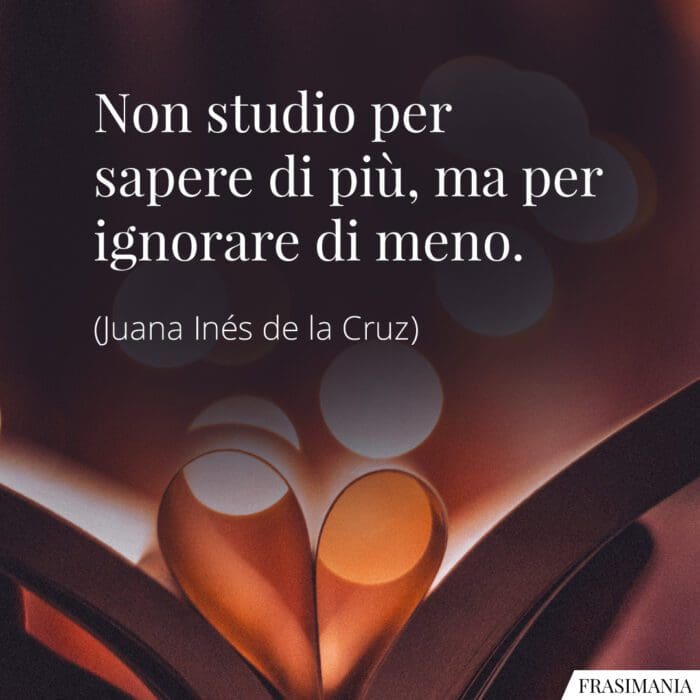
- An expert is a man who has stopped thinking. Why should he think? He is an expert.
Un esperto è un uomo che ha smesso di pensare. Perché dovrebbe pensare? È un esperto.
(Frank Lloyd Wright) - Sometimes the greatest wisdom is not knowing or pretending not to know.
A volte la saggezza più grande consiste nel non sapere o nel fingere di non sapere.
(Baldasar Graciàn) - He who knows all the answers has not been asked all the questions.
Chi conosce tutte le risposte, non si è fatto tutte le domande.
(Confucio) 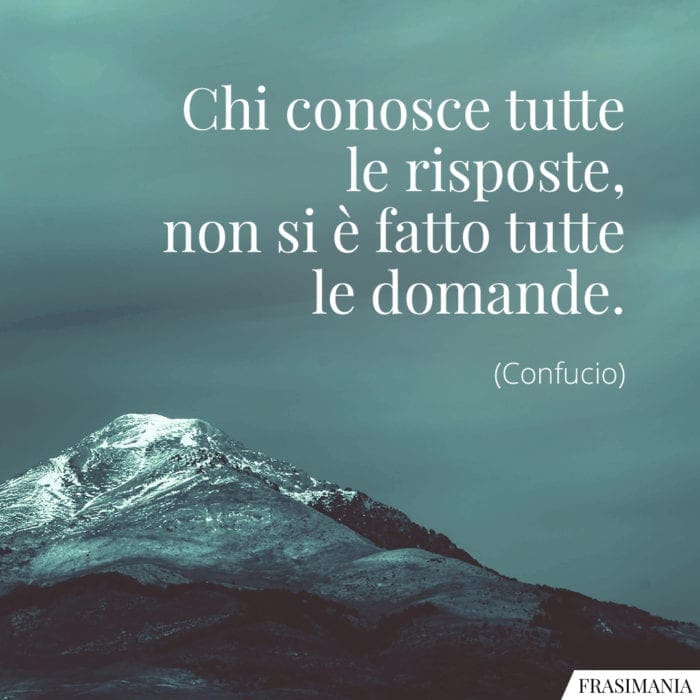
- It is impossible for a man to learn what he thinks he already knows.
È impossibile per un uomo imparare ciò che crede di sapere già.
(Epitteto) - Only fools and charlatans know and understand everything.
Soltanto gli imbecilli e i ciarlatani sanno e comprendono tutto.
(Anton Čechov) 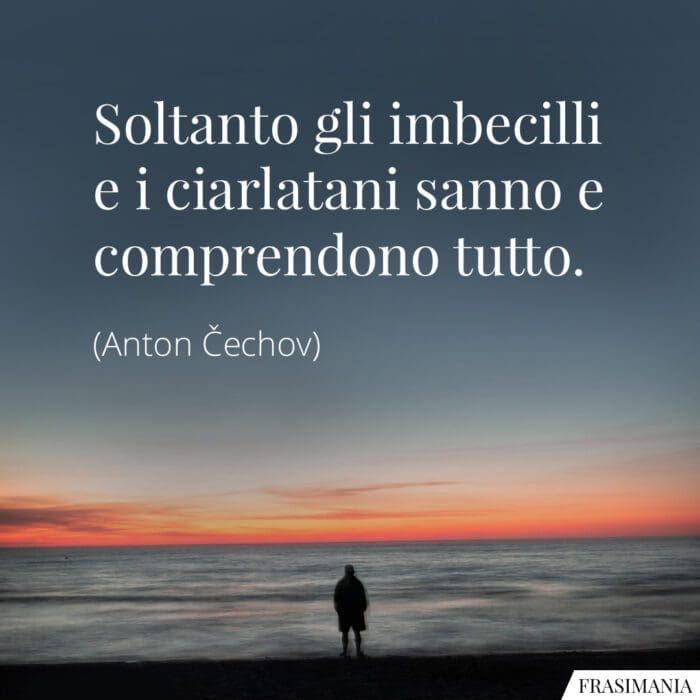
- There is no happiness without knowledge. But knowledge of happiness is unhappy; for knowing ourselves happy is knowing ourselves passing through happiness, and having to, immediatly at once, leave it behind. To know is to kill, in happiness as in everything. Not to know, though, is not to exist.
Non c’è felicità se non con consapevolezza. Ma la consapevolezza della felicità è infelice, perché sapersi felice è sapere che si sta attraversando la felicità e che si dovrà subito lasciarla. Sapere è uccidere, nella felicità come in tutto.
(Fernando Pessoa) - I am not young enough to know everything.
Non sono abbastanza giovane per sapere tutto.
(Oscar Wilde) 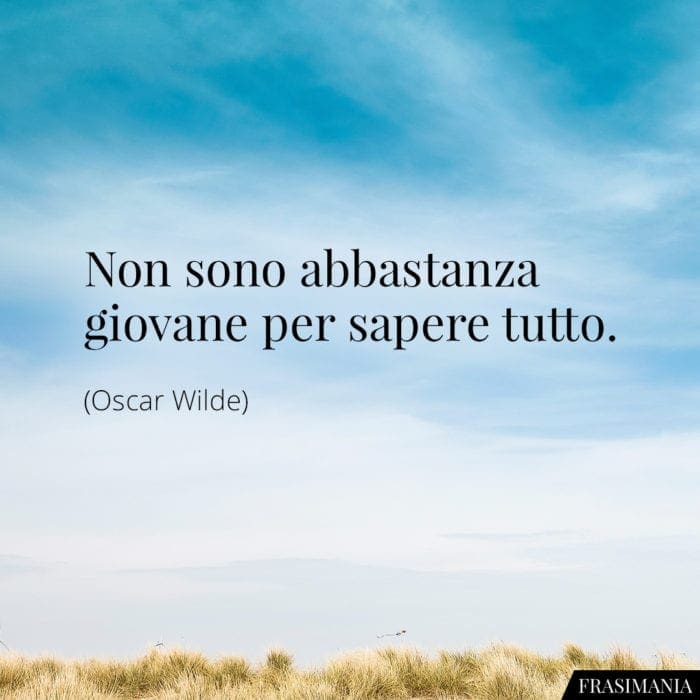
- To know that we know what we know, and to know that we do not know what we do not know, that is true knowledge.
Sapere che sappiamo quel che sappiamo, e sapere che non sappiamo quel che non sappiamo, questa è la vera conoscenza.
(Niccolò Copernico) - I cannot teach anybody anything. I can only make them think.
Non posso insegnare niente a nessuno, posso solo cercare di farli riflettere.
(Socrate) - Live as if you were to die tomorrow. Learn as if you were to live forever.
Vivi come se dovessi morire domani. Impara come se dovessi vivere per sempre.
(Mahatma Gandhi) 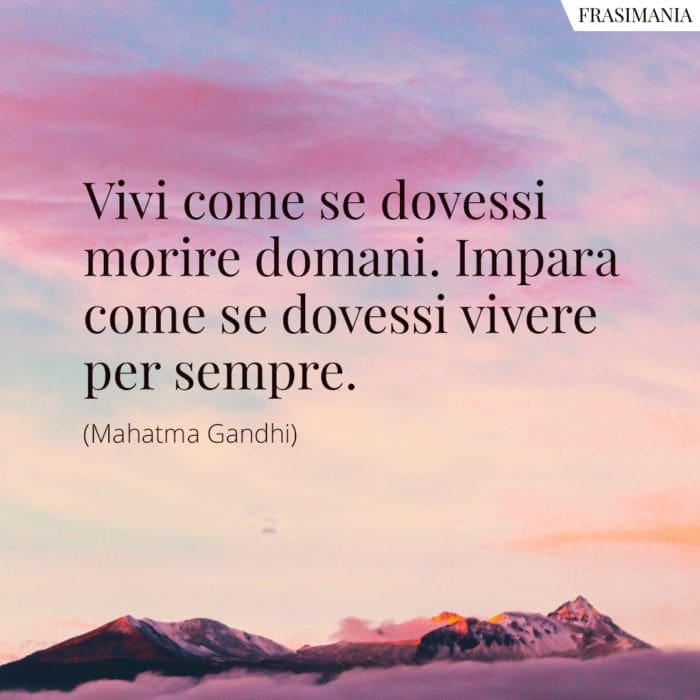
- Knowledge is of no value unless you put it into practice.
La conoscenza non ha valore se non la metti in pratica.
(Anton Čechov) - The things I know, every man can know, but, oh, my heart is mine alone.
Le cose che so le possono sapere tutti, ma il mio cuore c’è l’ho soltanto io.
(Johann Wolfgang von Goethe) 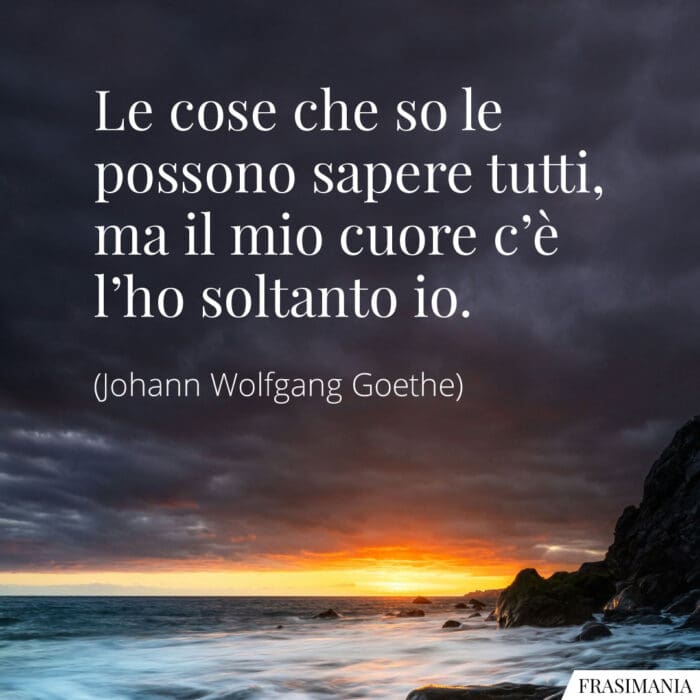
- The recipe for perpetual ignorance is: be satisfied with your opinions and content with your knowledge.
La ricetta per una perenne ignoranza: essere soddisfatti delle proprie opinioni e contenti del proprio sapere.
(Elbert Hubbard) - The knowledge and reason speak, ignorance and error shout.
Il sapere e la ragione parlano, il torto e l’ignoranza urlano.
(Arturo Graf) 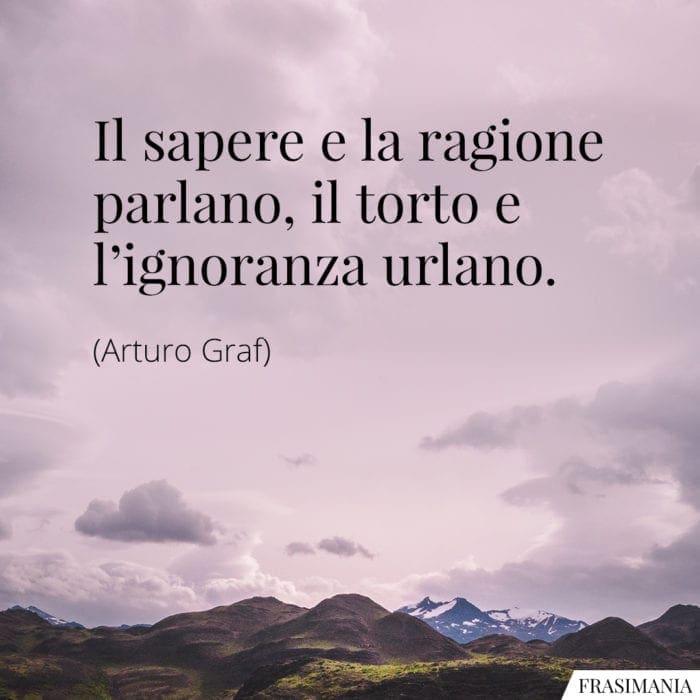
- Imagination is more important than knowledge. Knowledge is limited. Imagination encircles the world.
L’immaginazione è più importante della conoscenza. La conoscenza è limitata. L’immaginazione abbraccia il mondo.
(Albert Einstein) - Knowledge without judgment is double madness.
La conoscenza senza buon senso è raddoppiata follia.
(Baldasar Graciàn) - The mind is not a vessel to be filled, but a fire to be kindled.
La mente non è un vaso da riempire, ma un fuoco da accendere.
(Plutarco) 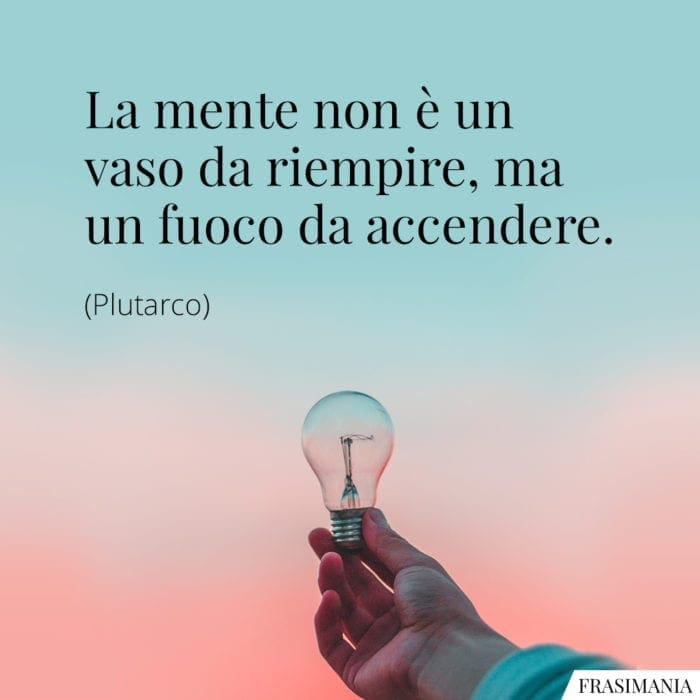
- Belief is not the beginning of knowledge – it is the end.
Credere non è l’inizio della conoscenza: è la fine.
(Johann Wolfgang von Goethe) - The more certain our knowledge the less we know.
Quanto più certa è la nostra conoscenza, tanto meno sappiamo.
(Georg Wilhelm Friedrich Hegel) 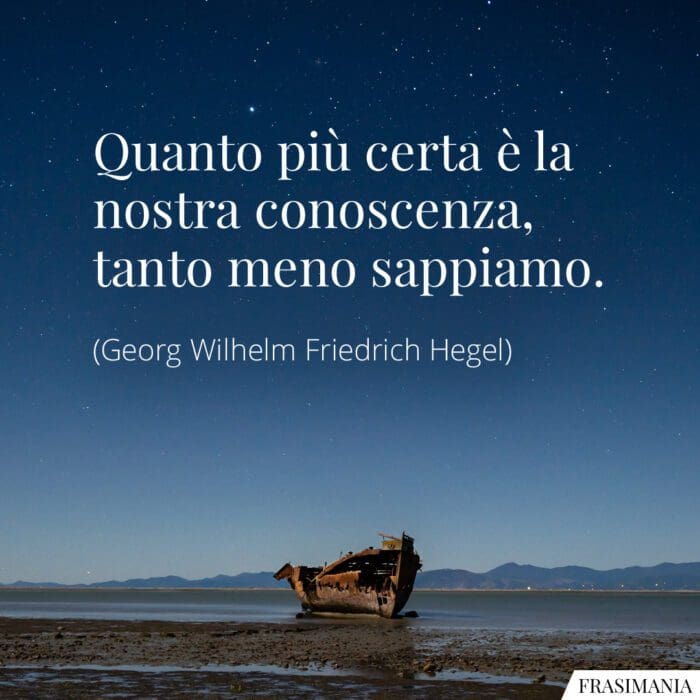
- No thief, however skillful, can rob one of knowledge, and that is why knowledge is the best and safest treasure to acquire.
Nessun ladro, per quanto abile, può derubare una persona della conoscenza, ed è per questo che la conoscenza è il tesoro migliore e più sicuro da acquisire.
(L. Frank Baum) - So long as your desire to explore is greater than your desire to not screw up, you’re on the right track.
Finché il tuo desiderio di sapere sarà più forte del tuo desiderio di non sbagliare, sarai sulla strada giusta.
(Ed Helms) - There are people who know everything, and unfortunately that’s all they know.
Ci sono persone che sanno tutto e purtroppo è tutto quello che sanno.
(Oscar Wilde) 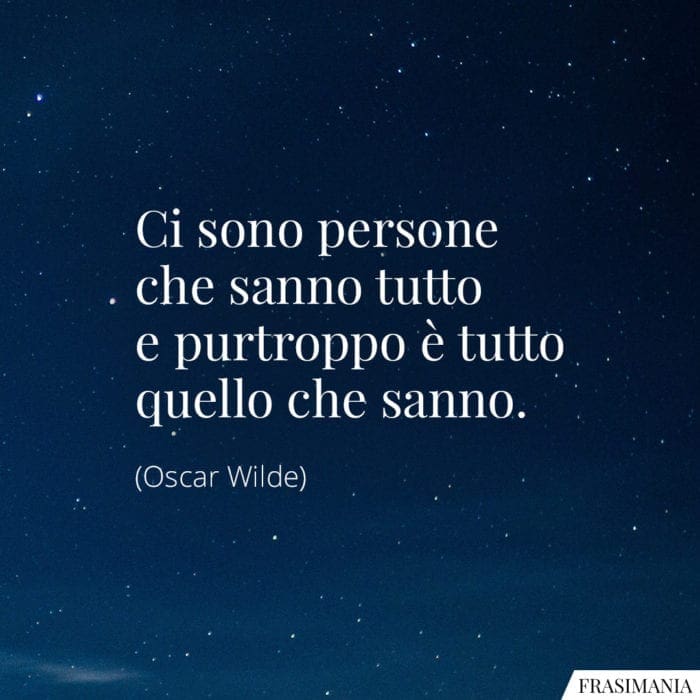
- I can calculate the motion of heavenly bodies but not the madness of people.
Posso calcolare il movimento dei corpi celesti, ma non la follia della gente.
(Isaac Newton) - The general population doesn’t know what’s happening, and it doesn’t even know that it doesn’t know.
La massa non sa cosa sta succedendo nel mondo. E non sa neanche di non saperlo.
(Noam Chomsky) 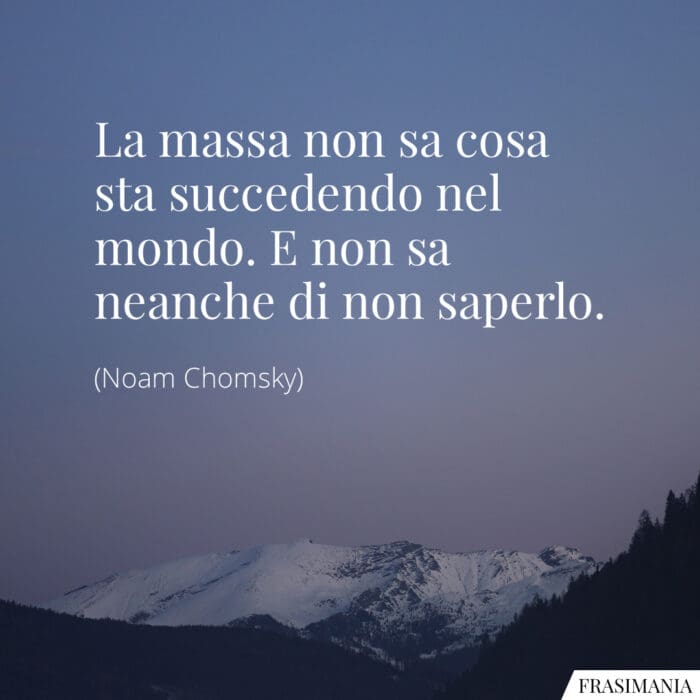
- Science is organized knowledge. Wisdom is organized life.
La scienza è conoscenza organizzata. La saggezza è vita organizzata.
(Immanuel Kant) - True ignorance is not the absence of knowledge, but the refusal to acquire it.
La vera ignoranza non è la mancanza di conoscenza, ma il rifiuto di acquisirla.
(Karl Popper) 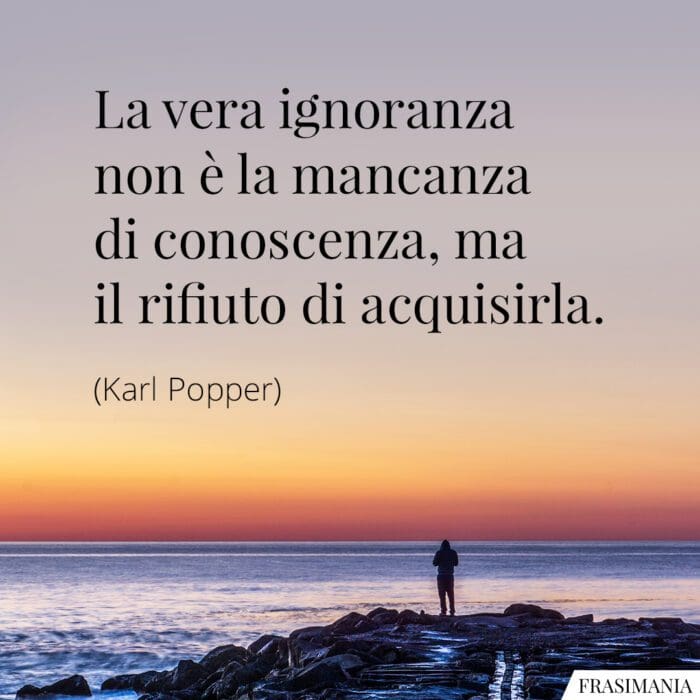
- Knowledge comes, but wisdom lingers.
La conoscenza arriva, ma la saggezza tarda.
(Alfred Lord Tennyson) - The art of being wise is the art of knowing what to overlook.
L’arte di essere saggi è l’arte di sapere che cosa trascurare.
(William James) - Experience is a hard teacher because she gives the test first, the lesson afterward.
L’esperienza è il tipo di insegnante più difficile perché prima ti fa l’esame, poi ti spiega la lezione.
(Vern Law) 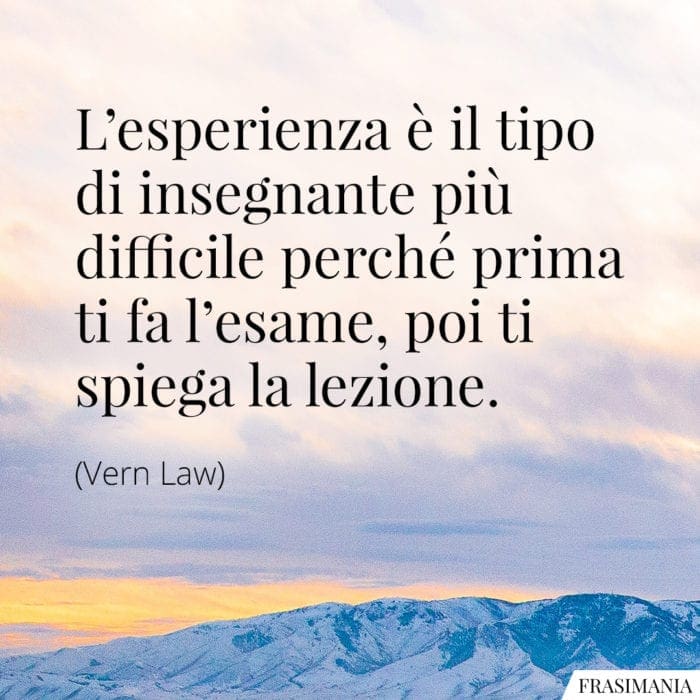
- Knowing is not enough; we must apply. Willing is not enough; we must do.
Non basta sapere, si deve anche applicare; non è abbastanza volere, si deve anche fare.
(Johann Wolfgang von Goethe) - It is the supreme art of the teacher to awaken joy in creative expression and knowledge.
È l’arte suprema dell’insegnante: risvegliare la gioia della creatività e della conoscenza.
(Albert Einstein) 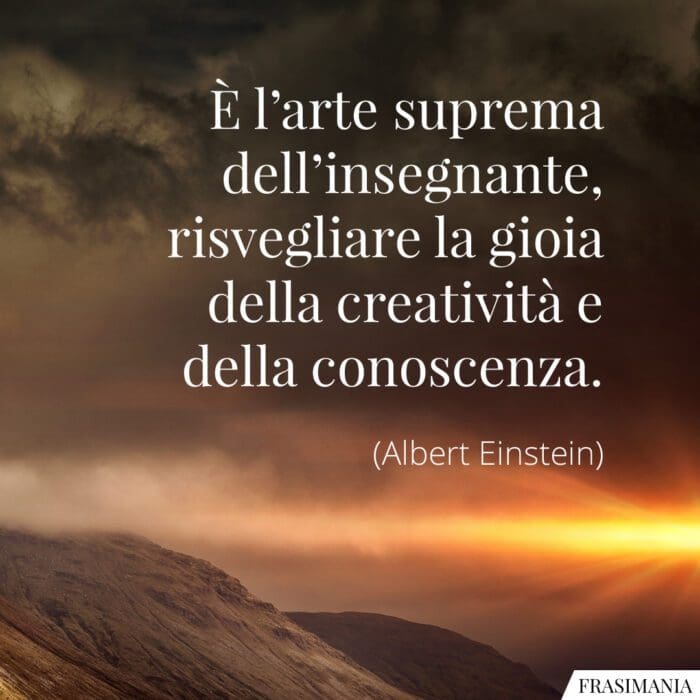
- Knowledge makes a man unfit to be a slave.
La conoscenza rende inadatti ad essere schiavi.
(Frederick Douglass) - The public have an insatiable curiosity to know everything, except what is worth knowing.
La gente ha un’insaziabile curiosità di conoscere tutto, tranne ciò che vale la pena sapere.
(Oscar Wilde) 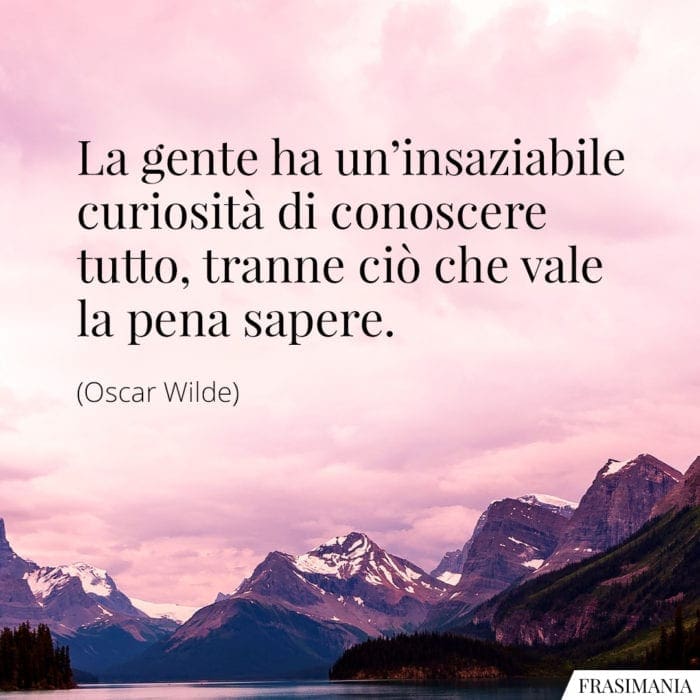
- Culture: the cry of men in face of their destiny.
Cultura: il grido degli uomini davanti al loro destino.
(Albert Camus) - Only the educated are free.
Solo chi è colto è veramente libero.
(Epitteto) 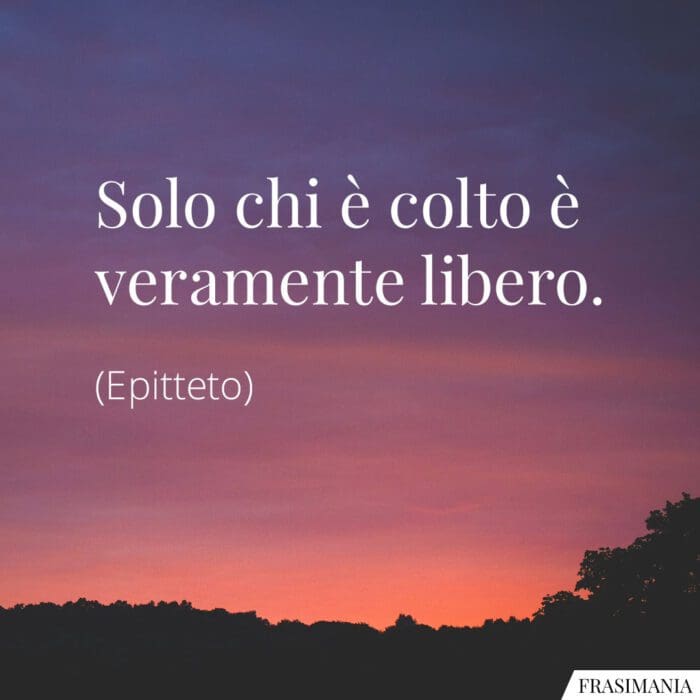
- An investment in knowledge pays the best interest.
Un investimento in conoscenza paga i migliori interessi.
(Benjamin Franklin) - Human behavior flows from three main sources: desire, emotion, and knowledge.
Il comportamento umano scaturisce da tre fonti principali: desiderio, emozione, e conoscenza.
(Platone) - Human history becomes more and more a race between education and catastrophe.
La storia del genere umano diventa sempre più una gara fra l’istruzione e la catastrofe.
(H.G. Wells) 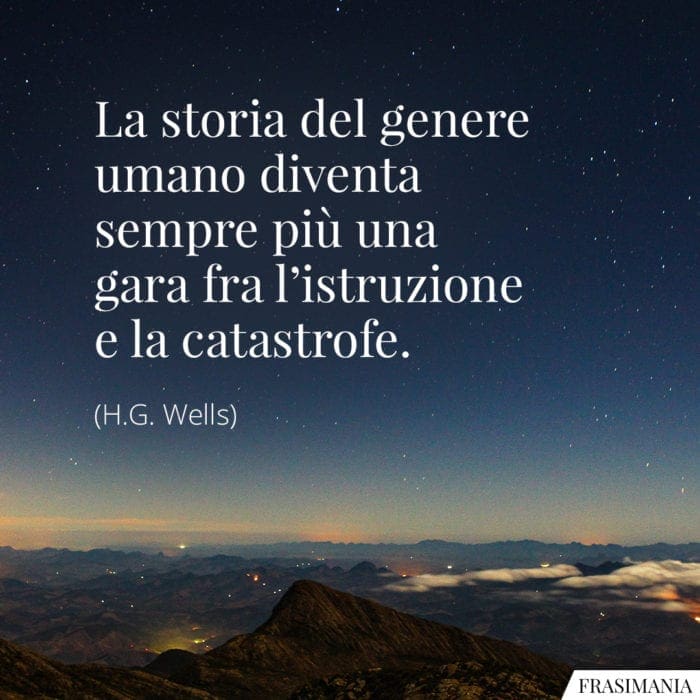
- What is now proved was once only imagined.
Quello che oggi è dimostrato fu un tempo solo immaginato.
(William Blake) - You can beat 40 scholars with one fact, but you can’t beat one idiot with 40 facts.
Puoi convincere 40 studiosi con un fatto, ma non puoi convincere un idiota con 40 fatti.
(Gialal al-Din Rumi) 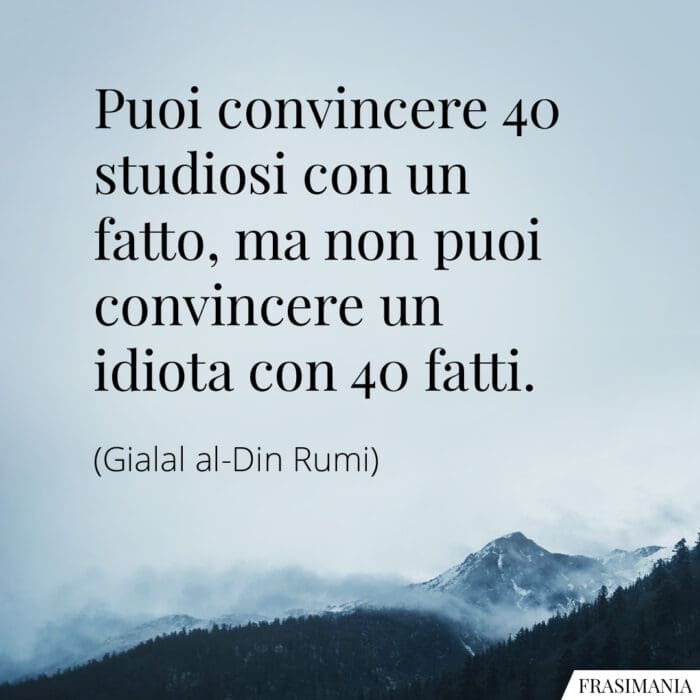
- The trouble with the world is not that people know too little; it’s that they know so many things that just aren’t so.
Il problema del mondo non che che le persone conoscano troppo poco, è che tante cose tra quelle che sanno non sono vere.
(Mark Twain) - All wish to possess knowledge, but few, comparatively speaking, are willing to pay the price.
Tutti desiderano possedere la conoscenza, ma relativamente pochi sono disposti a pagarne il prezzo.
(Giovenale) - Knowledge is power.
Sapere è potere.
(Francesco Bacone) 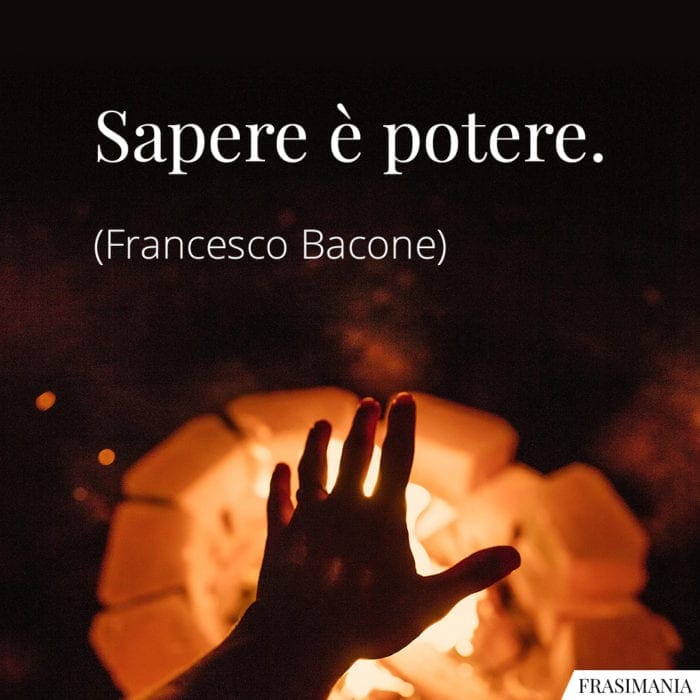
- Those who find beautiful meanings in beautiful things are the cultivated.
Una persona colta sa trovare un significato bello alle cose belle.
(Oscar Wilde) - The first and most important step towards knowledge is mutual love between learner and teacher.
Il reciproco amore fra chi apprende e chi insegna è il primo e più importante gradino verso la conoscenza.
(Erasmo da Rotterdam) 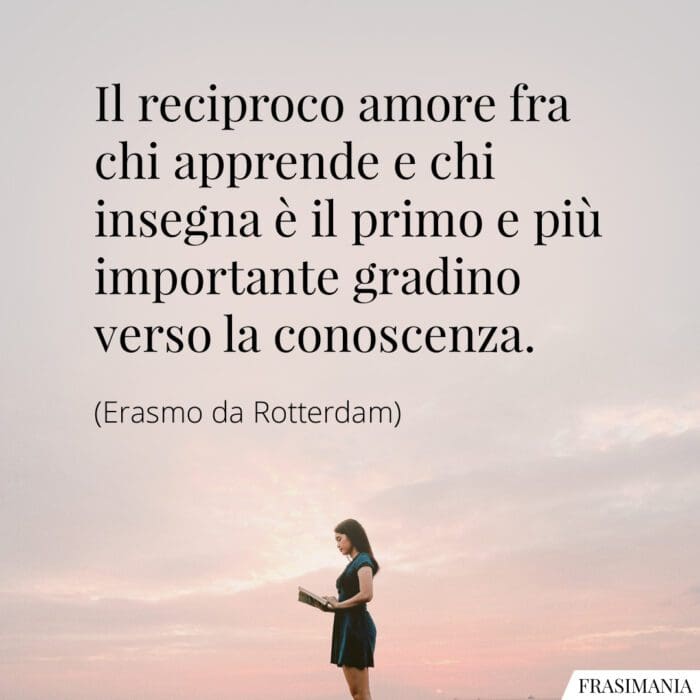
- We can know only that we know nothing. And that is the highest degree of human wisdom.
Possiamo sapere soltanto che non sappiamo nulla. E questo è il grado supremo della sapienza umana.
(Lev Tolstoj) - There are many things of which a wise man might wish to be ignorant.
Ci sono molte cose che una persona saggia dovrebbe augurarsi di non sapere.
(Ralph Waldo Emerson) - A mind is like a parachute. It doesn’t work if it is not open.
La mente è come un paracadute. Funziona solo se si apre.
(Frank Zappa) 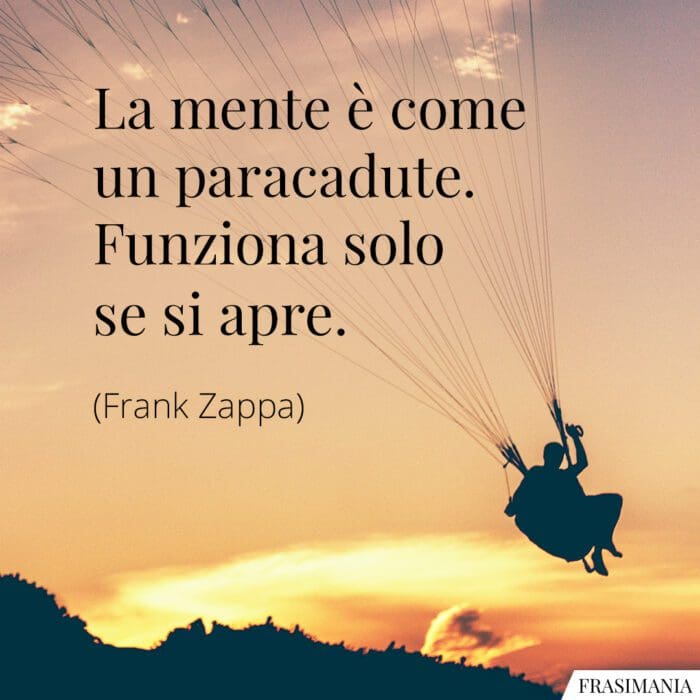
- How it is we have so much information, but know so little?
Com’è che abbiamo così tante informazioni, ma sappiamo così poco?
(Noam Chomsky) - Empty pockets never held anyone back. Only empty heads and empty hearts can do that.
Le tasche vuote non sono mai state un ostacolo per nessuno. Una testa vuota e un cuore vuoto, sì.
(Norman Vincent Peale) 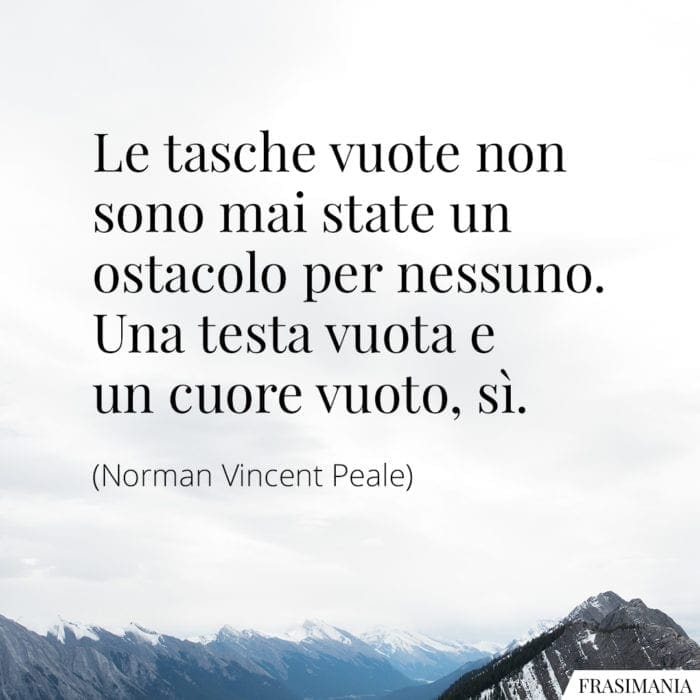
- The more I read, the more I acquire, the more certain I am that I know nothing.
Più leggo, più imparo, più sono certo di non sapere nulla.
(Voltaire) - An inventor is simply a fellow who doesn’t take his education too seriously.
Un inventore è semplicemente una persona che non prende troppo seriamente la sua istruzione.
(Charles F. Kettering) - I don’t want to believe. I want to know.
Io non voglio credere. Voglio sapere.
(Carl Sagan) 
- Knowledge is a treasure, but practice is the key to it.
La conoscenza è un tesoro, ma la pratica è la sua chiave.
(Lao Tzu) - Ignorance more frequently begets confidence than does knowledge.
L’ignoranza genera più fiducia della conoscenza.
(Charles Darwin) 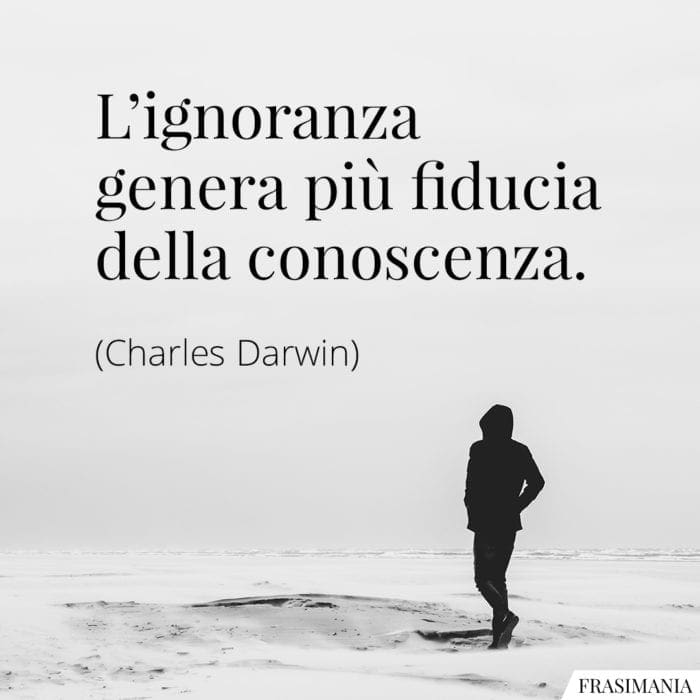
- The possession of knowledge does not kill the sense of wonder and mystery. There is always more mystery.
Il possesso della conoscenza non uccide il senso di meraviglia e mistero. C’è sempre più mistero.
(Anaïs Nin) - There are in fact two things, science and opinion; the former begets knowledge, the latter ignorance.
Esistono soltanto due cose: scienza e opinione; la prima genera conoscenza, la seconda ignoranza.
(Ippocrate) 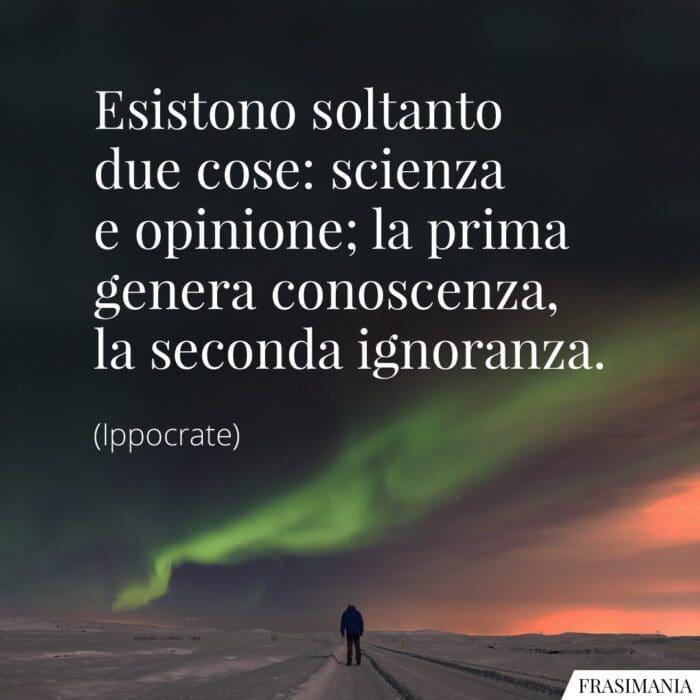
- The only source of knowledge is experience.
L’unica fonte di conoscenza è l’esperienza.
(Albert Einstein) - Never think that you already know all. However highly you are appraised, always have the courage to say to yourself – I am ignorant.
Non pensare mai di sapere tutto. Per quanto ti stimi, abbi sempre il coraggio di dirti: sono un ignorante.
(Ivan Pavlov) - There are two different types of people in the world, those who want to know, and those who want to believe.
Esistono due diversi tipi di persone nel mondo, quelli che vogliono sapere, e quelli che vogliono credere.
(Friedrich Nietzsche) 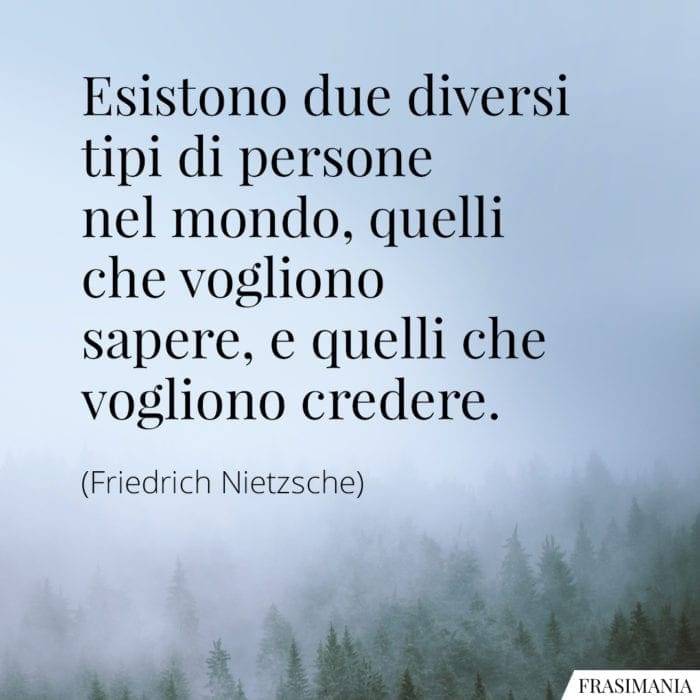
- Knowledge is proud that he has learn’d so much; wisdom is humble that he knows no more.
La conoscenza è orgogliosa di aver imparato tanto; la saggezza è avvilita perché non conosce abbastanza.
(William Cowper) - There is only one good, knowledge, and one evil, ignorance.
Esiste un solo bene, la conoscenza, e un solo male, l’ignoranza.
(Socrate) 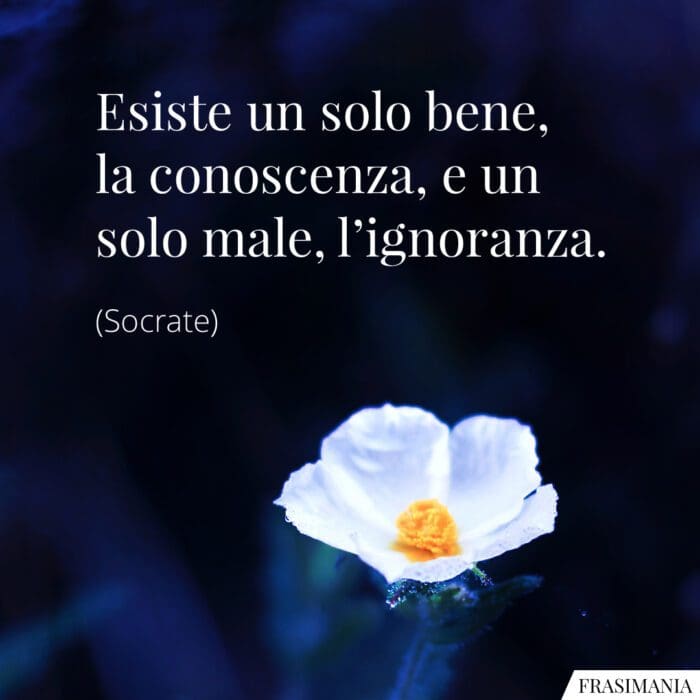
- The world is governed more by appearance than realities so that it is fully as necessary to seem to know something as to know it.
Il mondo è governato più dall’apparenza che dalla realtà ed è meglio far mostra di sapere qualcosa che saperlo.
(Daniel Webster) - The man who reads nothing at all is better educated than the man who reads nothing but newspapers.
Chi non legge niente è più colto di chi non legge altro che i giornali.
(Thomas Jefferson) 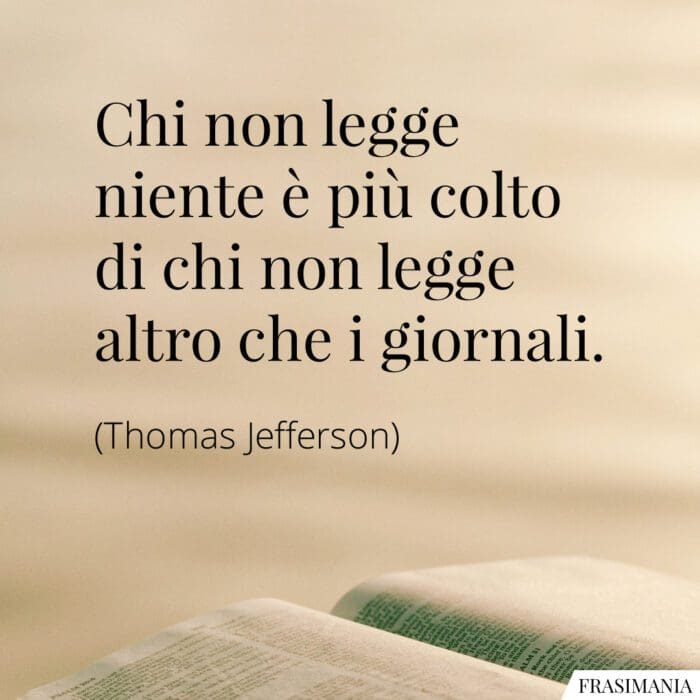
- The more distinctly a man knows, the more intelligent he is, the more pain he has; the man who is gifted with genius suffers most of all.
Quanto più un uomo conosce, quanto più è intelligente, maggiore è il suo dolore. Colui che è dotato di genialità soffre più di tutti.
(Arthur Schopenhauer) - Wisdom is one thing: to understand the mind which moves all things through all.
In una cosa consiste la sapienza, nel riconoscere l’intelligenza che governa tutte le cose attraverso tutte le cose.
(Eraclito) - You were not made to live as brutes, but to follow virtue and knowledge.
Fatti non foste a viver come bruti ma per seguir virtute e canoscenza.
(Dante Alighieri) 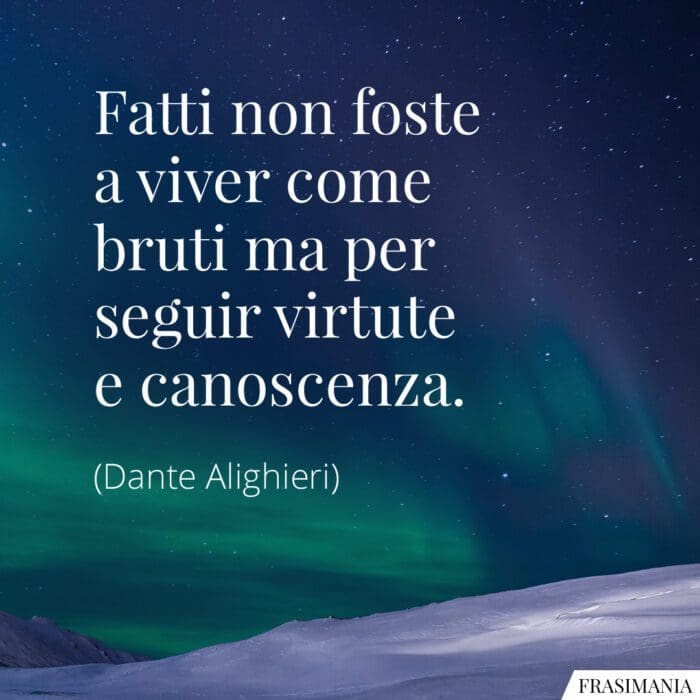
- Facts do not cease to exist because they are ignored.
I fatti non cessano di esistere solo perché sono ignorati.
(Aldous Huxley) - We know with confidence only when we know little; with knowledge doubt increases.
In realtà si sa solo quando si sa poco; col sapere aumenta il dubbio.
(Johann Wolfgang von Goethe) 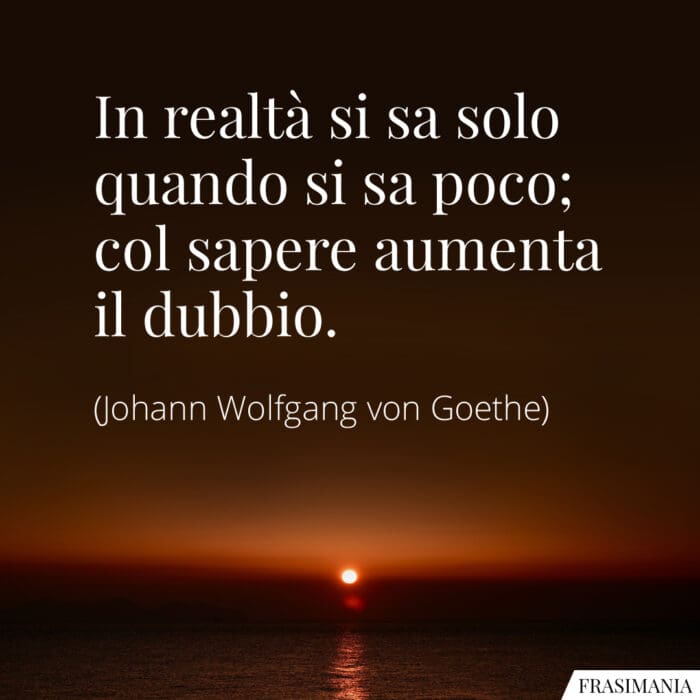
- Our knowledge can only be finite, while our ignorance must necessarily be infinite.
La nostra conoscenza può essere solo finita, mentre la nostra ignoranza è necessariamente infinita.
(Karl Popper) - There are only two kinds of people who are really fascinating – people who know absolutely everything, and people who know absolutely nothing.
Ci sono solo due tipi di persone davvero affascinanti: quelle che sanno tutto e quelle che non sanno assolutamente nulla.
(Oscar Wilde) 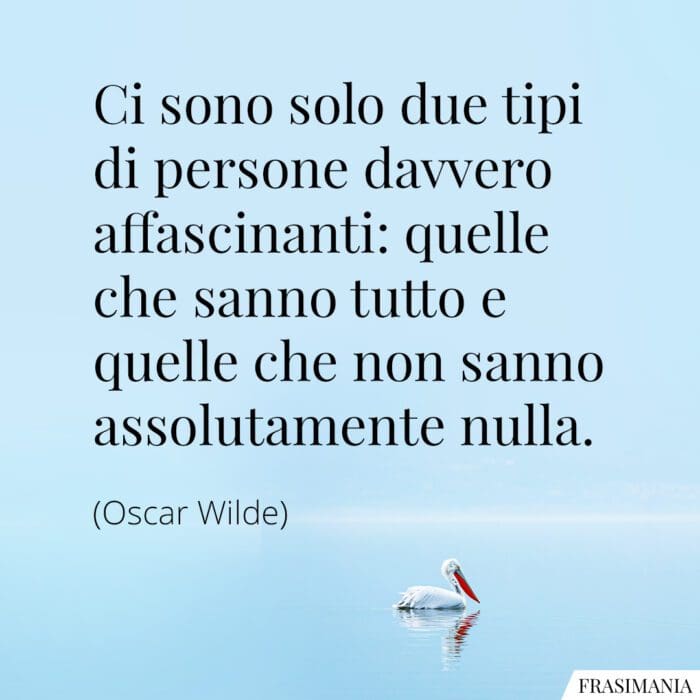
- Learning does not make one learned: there are those who have knowledge and those who have understanding. The first requires memory and the second philosophy.
Imparare non rende colti: ci sono quelli che hanno conoscenza e quelli che hanno comprensione. La prima richiede memoria, la seconda filosofia.
(Alexandre Dumas – Padre) - The man of knowledge must be able not only to love his enemies, but also to hate his friends.
Un uomo di sapere deve essere in grado non solo di amare i suoi nemici, ma di odiare i suoi amici.
(Friedrich Nietzsche) - To know the will of God is the greatest knowledge! To do the will of God is the greatest achievement.
Conoscere la volontà di Dio è la più grande conoscenza! Fare la volontà di Dio è la più grande conquista.
(George W Truett)


